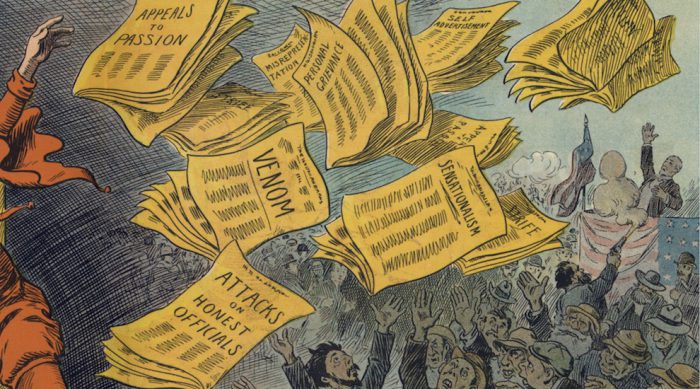
The growing stream of reporting on and data about fake news, misinformation, partisan content, and news literacy is hard to keep up with. This weekly roundup offers the highlights of what you might have missed. Starting today and each week through November 3, it will focus on U.S. election-related stories.
There’s been a raft of reporting this week on Democratic presidential candidate Joe Biden’s possible problem with Hispanic voters. “Trump is doing better with Hispanics than he did four years ago,” CNN’s Harry Enten reported. There are a number of reasons for this — as Derek Thompson noted in The Atlantic, those reasons include Florida’s “historically conservative Cuban American cohort” moving toward Trump and the fact that “young Latino men born in the United States seem to be inching toward Trump,” a nationwide shift.
Another possible contributor to Biden’s lack of success with Hispanic voters may be an onslaught of anti-Biden disinformation that “is inundating Spanish-speaking residents of South Florida ahead of Election Day, clogging their WhatsApp chats, Facebook feeds and even radio airwaves at a saturation level that threatens to shape the outcome in the nation’s biggest and most closely contested swing state,” Sabrina Rodriguez and Marc Caputo reported in Politico this week.
In South Florida, veteran Latino Democratic strategist Evelyn Pérez-Verdia noticed this summer that the WhatsApp groups dedicated to updates on the pandemic and news for the Colombian and Venezuelan communities became intermittently interspersed with conspiracy theories from videos of far-right commentators or news clips from new Spanish-language sites, like Noticias 24 and PanAm Post, and the YouTube-based Informativo G24 website.
“I’ve never seen this level of disinformation, conspiracy theories and lies,” Pérez-Verdia, who is of Colombian descent, said. “It looks as if it has to be coordinated.” [….]
On Informativo G24, longtime Colombian news anchor Sandra Valencia brings on guests via webcam for discussions about Latin America and U.S. politics with analysis that often relies on conspiracy theories, such as how Black Lives Matter and other activist groups are planning a “siege” on the White House later this month. The site does not detail who funds it, but asks supporters to donate to a PayPal account registered to Valencia.
Valencia bills her Spanish-language YouTube page, which has more than 378,000 followers, as a channel for geopolitical analysis. But it often resembles English-language right-wing news sources, such as Infowars, sharing conspiracy theories and strong anti-globalization messages.
And unlike the conspiracy theories that circulate in English-language news media and social media, there’s relatively little to no Spanish-language media coverage of the phenomenon nor a political counterpunch from the left.
Some of the disinformation discussed on Informativo G24 has been led by Omar Bula-Escobar, a former United Nations representative and Colombian geopolitical analyst, who in recent years has become a frequent guest on various Latin American radio and television news shows to talk about globalization. Bula-Escobar, who’s also a frequent guest on Miami-based Radio Caracol — which is one of Colombia’s main radio networks and widely respected throughout Latin America — has gained an increasing amount of notoriety for pushing the claim, often seen as anti-Semitic, that billionaire George Soros is “the world’s biggest puppet master” and is the face of the American Democratic Party.
“Who’s going to celebrate the day, God forbid, Trump loses? Cuba; ISIS, which Trump ended; Hezbollah, which Obama gave the greenlight to enter Latin America; Iran; China … All the filth of the planet is against Donald Trump. So, if you want to be part of the filth, then go with the filth,” Bula-Escobar said in a recent episode of Informativo G24.
This aligns with my experiences. I’m not seeing any fact-checking or “fake news” labeling for Spanish-language misinformation on Twitter or Facebook. Conspiracies are flourishing with virtually no response from credible Spanish-language media outlets. https://t.co/WOPsr72blL
— Yamil Velez (@YamilRVelez) September 14, 2020
This week, the Miami Herald’s sister Spanish-language paper, El Nuevo Herald, apologized after running a racist and anti-Semitic paid insert that was flagged by readers.
Today’s @elnuevoherald, the @MiamiHerald‘s Spanish-language paper, ran a 40-page insert full of fanatical right-wing extremist propaganda including a racist and anti-Semitic article comparing BLM to the Nazis #BecauseMiami h/t @ajhoward121 pic.twitter.com/CbvtSEn4h0
— Billy Corben (@BillyCorben) September 11, 2020
“What kind of people are these Jews? They’re always talking about the Holocaust, but have they already forgotten Kristallnacht, when Nazi thugs rampaged through Jewish shops all over Germany? So do the BLM and Antifa, only the Nazis didn’t steal; they only destroyed.” pic.twitter.com/slSx7xXqBD
— Billy Corben (@BillyCorben) September 11, 2020
“The fact that no one in leadership, beginning with us, had previously read this advertising insert until this issue was surfaced by a reader is distressing. It is one of a series of internal failures that we are investigating in order to prevent this from ever recurring,” Aminda Marqués González, executive editor and publisher of the Miami Herald and El Nuevo Herald, and Nancy San Martín, managing editor of El Nuevo Herald’s managing editor, wrote in an open letter to readers Monday, promising a full review with findings published by the end of the week.
On Friday, Poynter’s International Fact-Checking Network announced FactChat, “the first collaborative project to unite U.S. fact-checking organizations with two major Spanish-language news broadcasters to fight mis/disinformation during the 2020 presidential campaign.” From the announcement:
From Sept. 15, 2020 until the Inauguration Day in 2021, fact-checkers from AFP, Check Your Fact, FactCheck.org, Lead Stories, MediaWise, PolitiFact, The Dispatch, The Washington Post Fact Checker, Science Feedback and USA Today will share their content with Telemundo and Univision. Both networks will translate the fact-checks to Spanish before republishing the content on their respective websites. […][The] IFCN will upload both the English and Spanish fact-checks into a new FactChat chatbot on WhatsApp.